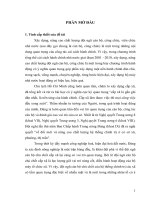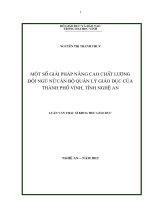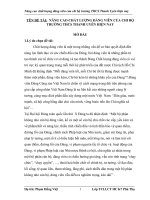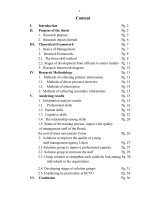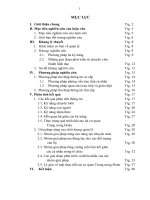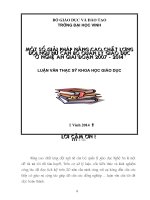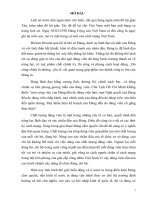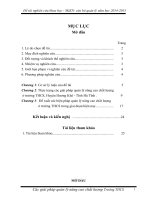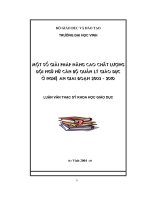nâng cao chất lượng quản lý của cán bộ lãnh đạo trẻ cơ quan trung ương đoàn (english)
Bạn đang xem bản rút gọn của tài liệu. Xem và tải ngay bản đầy đủ của tài liệu tại đây (498.76 KB, 42 trang )
2.4. Developing stages of solution groups Pg. 31
2.5. Explaining he practicality at HCYU Pg. 34
VI. Conclusion Pg. 36
Content
I. Introduction Pg. 2
II. Purpose of the thesis Pg. 5
1. Research purpose Pg. 5
2. Research objects limited Pg. 6
III. Theoretical Framework Pg. 7
1. Basics of Management: Pg. 7
2. Research Framework. Pg. 8
2.1. The three-skill method Pg. 8
2.2. Stages of development from officials to senior leaders Pg. 11
3. Research framework diagram Pg. 12
IV. Research Methodology Pg. 13
1. Methods of collecting primary information. Pg. 13
1.1. Methods of direct personal interview Pg. 13
1.2. Methods of observation Pg. 14
2. Methods of collecting secondary information: Pg. 15
V. Analyzing results Pg. 15
1. Information analysis results Pg. 15
1.1. Professional skills Pg. 16
1.2. Human skills Pg. 19
1.3. Cognitive skills Pg. 22
1.4. The relationship among skills Pg. 26
1.5. Status of the training process, improve the quality
of management staff of the Board,
the unit of mass movements Union Pg. 26
2. Solutions to improve the quality of young
staff management agency Union Pg. 27
2.1.Solutions group to improve professional capacity Pg. 27
2.2. Solution group to motivate the staff Pg. 29
2.3. Group solution to strengthen each symbolic link among Pg. 30
individuals in the organization
I. Introduction:
Ho Chi Minh Communist Youth Union is
a political and social
organization founded and led by the Communist Party of Vietnam along with
President Ho Chi Minh. Launched in 1931, during quite a long history, Ho Chi
Minh Communist Youth Union has expressed his outstanding role in collecting
and encouraging the revolutionary heroism among the young, substantially
dedicating to the national liberation, reunification, construction and defense.
Currently, Ho Chi Minh Communist Youth Union continues to affirm its value
in promoting the act of volunteering as well as the creativity and diligence
among Vietnam young people while the nation is under construction.
Simultaneously it can take care of and ensuring legitimate rights and interests of
young people in Vietnam.
Ho Chi Minh Communist Youth Union system is divided into 04 levels:
central level, provincial level and equivalent levels, district level or equivalent
levels and the unit level. Union Agency is the specific one in charge of the Ho
Chi Minh Communist Youth Union at the central level. It is widely known as “
the agency of the young." Indeed, if you have an opportunity to visit or work in
this agency, it’s quite an interesting thing to easily catch the sight of young
officials in the traditional blue color of the organization ranging from leaders
to principal officials in all boards and divisions. Actually, the number of the
middle-aged and old-aged in this agency is not significant . However, in this
case, the definition of "young" or "old" is not completely transparent, and the
statistics comparing the age among leaders at the Board levels or above from
different equivalent agencies in the same political system will prove that
opinion.
agencies
year
Central youth
union
Farmer union
Ministry of
Labour, War
Invalids and
Social Affairs
Ministry of
Transport
Avera
ge age
High
est
age
Low
est
age
Avera
ge age
High
est
age
Low
est
age
Avera
ge age
High
est
age
Low
est
age
Avera
ge age
High
est
age
Low
est
age
2009 36 43 31 43 60 38 47 60 36
2010 36,3 42 32 42.4 60 39 45 60 39 47 60 36
2011
36,3
42 33 43 60 38 46 60 40 30
2012
36,3
42 30 44 60 38 46 60 40 45 60 31
Table 1.1. Comparison of the average, the highest and lowest
of leaders among governmental agencies
3
We can see from the table 1.1 that all the three categories of the youth
union are lower than those of other agencies. Moreover the lowest and average
age of the Central Union tend to even further reduce as the next generation of
leaders being trained ( heads and deputy heads of division) are at a very young
age (the youngest born in 1988-25 years). On the other hand, the images of
young officials of the Union in government meetings or meetings of senior
officials are no longer rare. This is the fact existing alongside the history of the
Communist Youth Union.
In terms of policy, Communist Party of Vietnam has introduced to the Ho
Chi Minh Communist Youth Union a regulation restricting the first time age of
!
"##
$
younger officials to participate in the Executive Board, Standing Committee, and
Secretary Union Board . Unlike systems of other governmental agencies, that of
Ho Chi Minh Communist Youth Union is tenured. The head of the organization
is the National Delegate Congress. Every congress, the leading body which is the
Executive Committee is elected. Between the two sessions the Executive
Committee, the leading body which is Standing Committee is elected by the
Executive Committee . Between the two sessions of the Standing Committee, the
leading body which is the Secretariat of the Central Union is elected by the
Secretary of the Central Committee of the Board which is also the most senior
leaders of the Union bodies. The key factor here is that the staff appointed as
leaders, managers and central agencies team must be members of the Executive
Committee or the Standing Committee of Union. There are also exceptions when
the appointed officials are not yet a member of the Executive or Standing
Committee, however, those officials must soon be elected into either of
mentioned agencies if having a desire to be appointed to higher positions (the
deputy directors must be members of the Executive Committee and directors
must be one of Standing Committee members). Union officials regulation has
clearly defined the eligible age to occupy a position in the Secretariat ;the
Standing Committee and the Central Committee of the Union. Accordingly, a
member of Secretariat of the Central Committee for the first time must range
from 40 to 42 years old , a member of Standing Committee from 37 to 42 years
and members of the Central Committee delegation from 35 to 42 years old.
Other organizations do not restrict eligible minimum or maximum age like
Youth Union’s regulation ; they allow employees hold positions to 60 years old
for males, and to 55 for women (retirement age). Clearly, leaders in the Union
bodies are restricted into a relatively short time frame to strive and be trained
to be appointed to central agencies of the Union and other government ones.
%
Communist union work is a specific branch, because there is no available human
resource with formal training from educational institutions suitable for this job.
All the Union’s officials besides academic fields need to practice to have
enough experience to take on the job of a real union officials. Especially,
Central levels require higher and higher demand for the capacity of union
officials. What is interesting is how the top management team and central
agencies ensure the quality of human resources for leadership of this agency? To
clarify this interesting reality, let's have a research on objectives of the thesis.
II. Research on objectives of the thesis
1. The objectives of the thesis:
As mentioned above, reality shows leaders in central Union agencies have
the age group lower than the supply staff of other central units. In the beginning,
officials at the central agencies and groups other central agencies have a similar
age (23-24 years old, newly postgraduate), but at the appointed time to
management and executive position, the staff at the Union central bodies are at
the clearly lower age than staff of other agencies. In other words, the central
union officials have time to accumulate experience, professional training and
skills development executive, management shorter than staff at other central
agencies . Thus, is a short period of time sufficient enough for the staff in the
central agency to improve teamwork skills, specific knowledge or management
capability to ensure the appointed responsibility? And if there is a method good
enough, how can we manage it?
The ask for advanced capability of management personnel has long
existed among heads of agencies in the Central Union. Through practical
working in the central office along with the knowledge acquired in the
professional master's course management, we decided to choose the topic "
&
Improving the management quality of the young leaders of Ho Chi Minh
Communist Youth Union Central Committee "as the research subject. The
purpose of this thesis is to study efficient methods of how to improve the
management capacity of young leaders in the central agencies. Indeed the thesis
gives readers answers to two main questions:
First, which are the methods needed in the training process to nurture
young officials until they are appointed to management positions ?
Second , after being appointed to leadership positions, which methods are
needed to improve the management capacity of those leaders ?
To answer these questions, this thesis focuses on researching to clarify the
status of capacity management among the central Union agency officials. The
research training, retraining and limitations of those processes are also objects to
examine. Consequently, feasible solutions to enhance the management capacity
of Union agency officials
2. Limited research subjects:
Limited by research’s scale, this dissertation focuses on leaders at
medium level of the Central Communist Youth union agencies, specifically
directors and deputy directors of movement units belonging to the Central
youth union agencies. Other units are the press – publishing and business ones
operating under the regulations of the union and government agencies without
any limit about eligible ages, as the result, they are not considered as research
objects. On the other hand, leaders at medium levels play an important part in
personnel arrangement plan of The Union Agency. They all have experienced a
quite qualified training and had opportunities to occupy lower management
positions, so, they are direct candidates for senior positions in the agency. They
'
are also officials directly responsible for specific tasks of central Youth Union
agencies . Decisions given by these in duty time directly influence the
effectiveness of Union bodies for each specific segment.
In terms of quantity, the movement unit of Union agency has 11 smaller
departments and units. Each department has a head and 02 to 03 deputy heads
. Each tenure has to ensure a resource of more than 40 personnel with
outstanding characteristics for leadership positions in the departments and units.
The thesis is restricted in the field of training and retraining to improve the
management capacity of the leaders so as to fit the knowledge and research
capacity of the researchers and avoids making the thesis overwhelmed and
rambling.
III. Theoretical Framework
1. Basics of Management:
There have been many concepts of management given by researchers.
According to "Vietnamese Dictionary" (2010)
4
definition: "Management is the
act of organizing and operating things to fulfill certain requirements"; Mary
Parker Follett
5
noted that "management is the art of achieving your own goals
through other people"; and in a more specific perspective we can consider James
Stoner and Stephen Robbins’s definition:" Management is the process of
planning, organizing, performing and supervising the activities of the members
in an organization, together with all other resources of the organization to
achieve the objectives set out ", the word" process "in this definition is clearly
indicate that each task is resolved in a reasonable order in a nutshell, we can
$
()*
%
+,-.!/"012
3
conclude that management process includes activities that are arranged in the
below order:
- Planning: identifying objectives, reviewing steps and time to complete
the work, designed a more detailed plan.
- Organization: Taking full advantage of available resources required to
implement the plan, including staffing, job analysis, recruitment and personnel
distributions.
- Performance: Focusing on leadership factors and motivating employees
to work effectively to achieve the proposed plan.
- Supervision: Monitoring and examining the plans to ensure the progress
and quality and trigger necessary changes during the inspection.
2. Research Framework.
2
.1. Th
e t
hree
-s
kil
l
met
hod
:
On the basic definition of management described above, improving the
quality of management leaders are upgrading the quality of 04 management
stages including planning, organization, performance and supervision. In each
stage, an individual must combine variable knowledge and skills to perform.
There are many theories of administration
6
referring to the management
capability of an individual in the organization, such as Leadership theory, the
Science of Management by Frederick Taylor (1856-1915), further developed by
Herny L . Gantt, focusing on how material incentives policies for workers can
improve the quality of management . Behavioral - social psychology theories in
administration led by Mary Parker Follet (1868-1933) emphasizes that the
management efficiency and quality depend on human factors ,relationships
&
-#045*#! 6! !
! 74
57
"
1
within the organization and social psychology. The theory formulated by
Douglas Mc Gregor (1906-1964), Abraham Maslow (1908-1970), Chris Argyris
all refer to factors which managers should adopt to enhance the quality of
their management such as being concerned about in coordination between
departments within an organization, enabling employees to prove their own
ability. All the referred theories have contributed to build up the theory of
modern administration. Researchers’ team has explored and applied the three-
skill method
7
of modern administration to this thesis framework . In his research,
Dr. Nguyen Huu Than also indicate three characteristics worth emphasizing
during the development of an individual management capacity . Those are the
ability to develop professional skills, the ability to motivate people in the same
project team, and the ability to recognize the role of their organizations he or she
is in charge of
8
.
The three-skill method objects to the role of "an ideal manager" who are
able to handle effectively any problem in any organization. This method assesses
the capability of a manager through their performance and skills utilized on duty,
not their innate personalities. The word "skill" is defined here as the ability that
can be developed, trained and revealed through the performance of their
management. This method assumes management activities with 04 stages: plan;
organization, performance and supervision and based on 03 basic skills that can
be formed ,developed simultaneously with the act of people orienting activities
for individuals and taking responsible for achieving goals . It's professional
skill, human skill, and cognitive skill
9
.
'
-#045*#! 6! !
! 74
57
"
3
87.9:9#:9./;<4 22&
1
0,#-=! 6! !
! 7
77 "
2
- Professional skill: implies wide and specific knowledge in a particular
type of activity, related to the methods, manners, cycles, technologies to
perform that professional work. This skill requires specialized knowledge,
analytical ability in that field, the understanding of processes, procedures and the
utilization of specific tools for that specific task. These are skills that all officials,
experts, leaders will need to study and improve.
- Human skill: the ability of managers to make a team work efficiently and
motivate other individuals in the groups to perform collaborative work. While
professional skill interacts with objects (including physical, professional, cycle,
objects ), human skill interacts with members of the organization. This skill is
reflected through the attitude and awareness of managers with superior and
interior- level colleagues. It is considered as a critical skill of a good manager. It
requires managers” the sensibility” to beware of attitudes, assumptions, beliefs
of their own to other individuals, be comprehensible and sympathetic, as a result,
creating a positive and unified atmosphere in the organization.
- Cognitive skills: the ability to cover the organization , including the
recognition interdependence relationships among units in the same organization
and interactive relationships with other institutions, political forces, and more
general, the society. This skill includes the ability to foresee real tomb how a
change of a unit will affect the entire organization and the ability to implement
actions to improve the mutual benefit of the organization. In the manager
position of an organization ,the managering attitude of the administrators decides
all the nuances and "personality" of that organization, helping to distinguish
among them. These attitudes demonstrate the cognitive skills of managers. The
overall success of an organization depends on the cognitive skills of the
operators in the formation and implementation decisions for the organization.
Furthermore, we consider cognitive skills, with practical significance and
importance, is the harmonious synthesis of professional skills and human skills.
All three skills above cannot be separated in a mechanical way, moreover they
are always intertwined and difficult to distinguish sharply the end or beginning
of each skill. However, each level decides which skill you should emphasis, just
as we play different symphonies with different shades require differences of
physical power of hands, fingers, elbows though they all have to cooperate to
complete a perfect symphony.
2
.2. Th
e d
ev
el
op
men
t st
ag
es
.
With research subjects limited as young leaders from the Movement
department of central committee of HCM communist Youth union, we all
recognize that to improve the quality of a management generation requires a
thorough, top-to-toe training, not an instantaneous one. So, the process of
improving the management capability of those staff is divided into two phases:
the first stage is the screening process which is creating suitable environment to
foster the knowledge and skills necessary to develop management capacity of
individuals till they are appointed as the head or deputy heads of the committees.
Stage 2, in addition to developing nurturing environment for management staff,
policies must be set to facilitate management of the subjects. For each stage, the
manager has his own method to sharpen three skills mentioned previously.
- Phase I: Before appointing intermediate administrators.
It is the stage that officials, through specific working and communication
with colleagues…, reveal their best characteristics. In this stage, it can be divided
into two smaller phases, which are basic training phase and interference into
leadership- management capability. Training
10
, in this case, is a specific term
used when refer to building the labor force, so “training period” is applicable to
2
:/7>4/7?++4%3
all staff beginning to work to provide basic knowledge about the culture of the
organization, together with working virtues This is considered an crucial
period for each officials to form their own management capacity, especially the
planning, organizing, performing and supervising skills applying firstly to their
own task. The process of skimming the quality of their work help managers and
leaders to choose one of their staff who have outstanding capacity to continue the
practice, challenges through the next phase. This is the stage that officials and
experts have been selected will experience an environment to develop
professional skills, human skills and their cognitive skills.
- Phase II: After appoiting of intermediate administrators.
At this stage, leaders can actually perform the work of their management.
This stage is also perfect environment for the managers to perfect their skills.
Their cognitive skills are best expressed in this stage.
3. Research framework diagram
Developing management capability for intermediate-level officials of
CCHCYU ( central committee of Ho Chi Minh Communist Youth Union),
namely the head or deputy heads of the department of mass movement
department concentrates on measures to improve the quality of 03 skills
professional skill, human skills, cognitive skills in two stages mentioned above.
IV. Research Methodology
1. Methods of collecting primary information.
1
.1. Meth
od
s o
f di
rect
perso
nal i
nt
erv
iew:
Due to the complexity of information to information collectors, the
research team decided to focus on personal direct interviews which is suitable
with interview conditions of our group.
The researchers conducted interviews with individuals directly in 04
groups of subjects related to the research subject (The officer intermediate bike
- head, deputy head). Specifically:
- Group A: Human Resources Senior Manager of Union agencies: detailed
interviews with 02 Central Union Secretary, 01 who is in charge of general
affairs committees movement, 01 who is in charge of organizing agency
personnel in the Central Union (specific question - Appendix 01).
- Group B: Human Resources Management intermediate: detailed
interviews with the head, deputy heads of the 6/11 ones belong to The
Movement Unit, the CCHCYU (specific question - Appendix 02).
- Group C: Human Resources basic management: Detailed interviews with
Head (Movement Unit) and 01 deputy director of the center ( Movement Unit)
( specific question - Appendix record 03).
- Group D: Interviews with 09 direct employees of 09/11 department of
Movement unit with variable number working years ( 03 people have 01 years
$
of experience - D1, 03 who has 02 years of experience - D2 and 03 who have
03 years of experience - D3) (own question - Appendix 04).
- The content of the questionnaire follows the steps described below:
+ Determine data needed to find: for each type of interviewees , the
research team determines the content of information needed to collect, and
organize the content from easy to difficult, from short to long ones.
+ Identify the method of interview: in personal and direct interview , we
can use many long, complicated, communicative questions to express and
obtain information more easily.
+ Content Outline questions and how to ask the question: questions do not
overlap each other, the main use of open questions, less use of closed
questions.
+ Determine the question type structure: Each interview is expected to use
an average 6-8 logical questions, from short to long, from easy to difficult.
+ Strictly control the interview content, avoid ambiguous answers as well
as misunderstanding for the readers.
1
.2. Obs
erv
at
ion
met
h
ods
(di
rect
an
d i
ndi
rect
)
The team consists of two member; one is a staff member of a Board of
mass movement, the Union's Central Committee and the other is head deputy
of mass movement unit of CCHCYU . Therefore, the research team possesses
facilities to gather information in both direct and indirect way.
- Direct observation: the research team conducted direct observation of officials
groups (group I), basic managers group (group II), intermediate managers
group (group III) of 04 departments of Movement Unit, having comparison
about the time taken to complete different tasks (corresponding skills) and the
%
attitude with superiors, peers and subordinate levels in 01 month period.
- Indirect Observation: the research team conducted indirect observation of
staff group (group I), basic managers group (group II), intermediate managers
group (group III) of 04 departments of the Movement Unit; having comparison
to the materials regularly exposed by each group in their daily work, listing
their schedule working via email (through groupmail system of departments
and units), the history and content of the meeting, the meeting of the group of
objects (through clerical regime) in 01 months time.
Other data collection methods such as surveys, questionnaires, surveys by
the sample aren’t used because of its likely inefficiency and incorrection.
2. Methods of collecting secondary information:
By collecting the data table, the data quality assessment conducted in the
monthly reports, quarterly volume movement Units Union agency, the
statistics, press periodic reports on the work of the Union's offices (through the
organization), profile leaders planning, management of the Ho Chi Minh
Communist Youth Union from the period
2012
to 2017 statistics,
comparison between assessment data and information for analysis.
V. Analyzing the results
1. The results of the analysis of information
After collecting, evaluating, comparing and analyzing primary and
secondary date, by sorting method combined with aggregate statistics and
dialectical reasoning, the team has conducted results. As research has shown
frame 3 elements of the management capacity of an individual expressed
through three skills, which are professional skills, human skills and cognitive
&
skills. The data and information aggregated and statistical analysis help to
assess each skill:
First, is this skill needed for a manager or not?
Second, if this skill is necessary, in which stage should the manager
develop which skill? how can they develop this skill?
Third, are the senior leaders in CCHCYU qualified enough for this skill?
The process of gathering, analyzing the information in the forms of direct
interviews with individuals and groups and help the team assess the level of
awareness about the importance of skills for groups (A, B, C, D), and the desire
of each target group for managers of intermediate bodies Union, which is also
the basis for proposals to help our solutions more realistic.
1
.1. Pro
fes
sion
al
ski
lls
.
Professional skills covers the knowledge of officials about the specialized
knowledge and analytical ability in that field, the understanding of processes,
procedures and how to take advantage of resources and professional tools .
More specifically, HCYU has a vast knowledge about the mass youth
audience; policies of the Communist Party of Vietnam to each kind of subject
about operations in the youth movement; the analytical skills, creativity to task
given when working at practical positions.
* About the needed information through interviews with groups A, B, C,
D1, D2, D3: 100% of respondents conlude that the professional skill is
necessary for all staff members and management in all stages of development.
By analyzing information from direct and indirect observations, 100% of group
I, II, III use the agency time to do professional work, 100% of group exposed
'
to the materials on professional work, using the email system to exchange
professional works and meetings are scheduled for the purpose of professional
work Thus, we can conclude that professional skill is essential for all staff
members and leaders.
* On stage need to develop professional skills: Group D1, D2, D3 are
provided the information they need to develop this skill. Group A have the
opinion t that they need to sustain their professional skills. Group B and C that
they still need to develop professional skills, but in decreasing order (from C to
B). The results of analysis of information directly from group I, II, III shows
that time needed to dicuss problems descending from group I, II, III. Analysis
of indirect information from the groups I, II, III shows the relative frequency of
using email to exchange the contents of the work and set up appointments with
the nature of work is decreasing from group III, II, I Conclusion:
Professional knowledge is important for team officials and experts, specifically
Vietnam age group experienced staff is young. As people in the organization
promote, the amount of time devoted to the job specific expertise tends to
decrease. So, in the training phase it is crucial to develop this skill. Statistics
gathered by the Union organizers also showed 100% central staff are university
graduates, or formally trained masters. This is a very good input for the
development of these skills.
* How to develop this skill? Development of professional skills is the
development of knowledge, professional skills, and analytical skills, assess,
advise and knowledge from the actual process under the lower base of the
analysis believe that the group D1, D2, D3 tends to increase gradually in the
desire to develop more knowledge about the actual bottom base. Groups A, B,
C said that the practical knowledge while working under the grassroots level is
indispensable and should always be supplemented with regular increases with
3
the level of human development in the organization, appointment impulse for
knowledge analysis, evaluation, inference has been trained to work.
* Review of the current immediate level administrators’ skills: 100% of
information gained through the interview process groups A, B, C, D indicated
that generally, immediate level leaders in HCYU have a standard professional
skill.
Below are a summary of information about groups interviewed on
professional skills:
Information
Groups
Practicality Starting stage
Developing
manner
Status
A
Yes
Maintaining
the stable
professional
skill
Highly
appreciate
reality
experience
( ascending
from C to A)
Generally
qualified
B
Yes
Want to
enhance their
own
professional
skills( descend
ing from C to
B)
Generally
qualified
C
Yes
Generally
qualified
D1
Yes
Always in the
mood for
In the mood
for perfecting
Generally
qualified
1
D2
Yes
being trained
in
professional
skill
professional
skills
Generally
qualified
D3
Yes
Generally
qualified
Table 2: General information on professional skill
1
.2. Hu
man
s
kil
ls
Skill is the ability to bend people to manage labor effectively in a team
and motivate other individuals in the groups perform collaborative work. One
thing in particular, it is people skills is a natural activity, constantly. It requires
sensitivity not only in time but also a decision in the daily behavior of
individuals. Human skill is not a skill "when it needs to use", it is the
development of a sensitive, delicate itself every manager before the different
situations, it can not be artificially . And so, how to develop people skills is one
way to develop naturally, unconsciously, to become an integral part of the
whole nature of a manager.
* About the needed information through focus groups D1, D2: the
information respondents are unaware or unclear that the people skills necessary
for their work. Group D3, C realize that people skills is one of the additional
skills to get the job done with good effect. A special group and group B
confirmed that people skills are essential for the management of their
operations. Direct observation and indirectly also to the group result I almost
attitudes construction work to develop people skills. In contrast, group II and
group III special to spend time thinking about how to develop their skills in
2
humans.
* On stage need to develop people skills: Group D1, D2, D3 does not
clearly identify the time to develop these skills, they often assume that it is the
nature of every person. Group A, B and C for that they have to actively develop
their people skills and are stated in clear that, to the human development of
their skills from the first day to the organization. At the position of the manager
whether large or small, they learn people skills that help them more in
management. People skills demonstrated its importance in the intermediate
level, where the number of direct communication between managers with
subordinates, between managers with their business peers, mid-level managers
and Management is the largest higher. Growing up, the communication times
between the managers as being reduced in proportion to relative. Therefore, the
development stage to the most powerful people skills are stage managers
intermediate.
* How to develop this skill? Skill is the totality of human sensibility,
refinement of each person, accept differences of opinion, attitude, self
confidence and other people to understand what other people say and talk to
people other out. Direct observation showed that the groups I, II, III tend to
choose the attitude to communicate with different groups at work: clever to the
upper leaders , outspoken, candid with their business peers, and powerful to
inferior level collegue. The attitude with clear target groups asserted that every
human self is still developing the skills of their people, which determined the
efficiency of their work. The group interview data D1, D2, D3 did not know
which skills should be developed in which stages. In the meantime, group B, C
are more concentrated on their work as well as more patient. They attentively
listened patiently, thinking about the attitudes and behavior of people over, and
this one conducted regularly in a variety of ways, control the individual strokes
his candor They are willing to participate enthusiastically in serious classes
to develop these skills with a little help from the school administrators
Direct and direct and indirect observations shows the link between the rise in
the intensity of lessons and the desire to obtain more professional knowledge.
Although Group A has developed this skills for a very long time and
undeniably created some outstanding individuals, mastering this skill actually
requires innate gift of their own.
There are some disagreements in the evaluation review about the status of
immediate level leaders. Group C, B and A suggested that those leaders need to
enhance substantially their human skill all the time.
We synthesized information groups into the below table to illustrate the
status of human skill
categories
groups
Practicality Starting stage
Developing
manner
Status
A
Truly essential
Require early
support right
from the
immediate
level
Gaining their
own experience
and
continuously
developing
human skill
Still in the
mood
for
enhancing
human skill
B Taking full
advantage of
their own right
and ability,.
C
Aware of
the
fact that
human skill
needs to be
improved
Simultaneously,
participating in
classes.
D1
Take no care
of developing
this skill
Have no idea
how and when
to pick up this
skill
Pay no
attention on
human skill
D2
Poorly aware
of the situation
D3
Table 3: Review on human skills
1.3. Co
gni
ti
ve sk
il
ls
Cognitive skills of a manager thinking represents an overview of the
relationship between the unit and the organization is in the middle of his
organization to the organization or unit. It is understand and predict changes in
the unit, other units have gas changes from one department, expanded to
visualize the relationships between components, their organization with the
other unit, the community, the social and political forces The manager has
good cognitive skills is likely to coordinate the parts of a unit by a single
change creates nuances specific to your organization.
* About the needed information through focus groups D1, D2, D3: the
information respondents are unaware or unclear that the cognitive skills
necessary for their work. Simply because their work does not require the skills
to coordination and cooperation between the departments that are largely fish
nhan.Nhom C, the group will begin to have contact management realized that
skills awareness is a critical skill of the manager. Group B and in particular,
group A claim that cognitive skills are essential for the management of their
operations. In group A also information that the location of their senior
management, with particular emphasis on their cognitive skills than the other
two skills.
* On stage need to develop cognitive skills: Group D1, D2, D3 does not
clearly identify the time to develop these skills and tasks in their work is not
required to develop this skill Group A, B and C that they must actively to
develop their cognitive skills and clearly recognize that, to develop cognitive
skills as they desire / plan to be a manager . Understanding thorough and deep
understanding of the organization that is not a moment to go through the
process of reflective practice, research and management experience and
executive. Results observed directly and indirectly by the Group I, II, III, and
for the same results as some email direct coordination between the organizers,
the meeting of the coordinated plan the time working for the goal of
coordination among organizational units within the group increased from I->
III. Thus, the high level of development, managers increasingly need to show
their cognitive skills.
* How to develop this skill? There are many ways to develop cognitive
skills of an individual in the organization. Group D1, D2, D3 provide
information about them to develop their cognitive skills through the guidance
of their superiors. This is a form of training was popular, when superiors to
subordinates developed the ability to run and manage their. The group of
people I often refer to comments on the accumulated level of knowledge of the
organization, through the innovative development of the cognitive skills.
However, those in group C had other priorities in the development of their
cognitive skills. The C group who want to develop cognitive skills through the
practical knowledge they have acquired to undertake management functions in
various units. They argue that the knowledge of managers on their
$
communication level is necessary and valuable, but it is other people's
perception conveyed to them, not their perception. Even the level of training on
the answer they want whenever questions are suggestive, but not a control
point answer xac.Day is a step forward in quality between the professionals
professional work and those who have taken the time to do the role of a
manager. Group B and A view to develop their cognitive skills as a natural
process, unconscious. Considering the peculiarities of the Union, a branch
interactive high society. The senior management in addition to good
professional work, have good people skills but need to develop social
relationships, collect a variety of information and resources to build the only
point direct, reactive attitude to properly organize the most. The layer depth
tutorial by professional reports of these skills are also groups A and B option as
a viable solution.
Review on the cognitive skills of immediate leaders in HCYU: Group D1,
D2, D3 assesses that immediate leaders have a general good cognitive skill.
It’s quite a easy thing to understand because the input to the agency all had to
experience a standard training and some time working as a administrators at
lower positions. Group C and D, however suppose that those managers need to
improve their cognitive training constantly. Group A, finally, expressed the
idea that cognitive skill of those administrators is still far from perfection.
We have synthesized a table reviewing status and opinion about cognitive
skills
%
categories
groups
Practicality Starting stage
Developing
manner
Status
A
Holding many
key positions
in
administrating
duty.
Need to be
developed
as
early
as
possible
Self training
through
practical
working
Not
guaranteed,
especially in
application of
cognitive
skills with
other agencies
B
Having
potential
factors to be a
administrator
In addition of
actual
experience,
there are little
guide from
upper level
Needed to
strengthed
C
Aware of
crucial skills to
become
a
administrator
Trained when
reached the
managing
position
D1
Unaware of the
necessity of
cognitive skill
Have no idea
of when and
how to
develop this
skill
Having the
desire
to
enhance
cognitive skill
Having quite
a good
cognitive skill
D2
D3
Table 3: Review on cognitive skills
